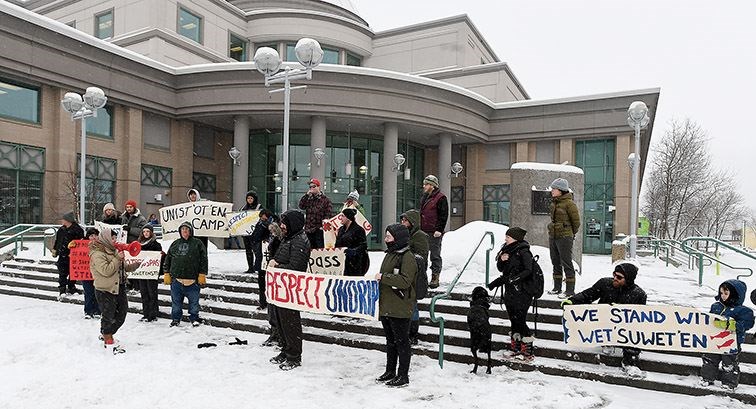To an outside investor, especially an American, it may seem odd to learn that, in Canada, when opponents make their case against a pipeline or any other resource project before regulators, the Canadian government sometimes pays them to do it.
It may seem especially masochistic that some environmental groups that are already well funded received money from taxpayers to try to thwart a project owned by Canadian taxpayers: the Trans Mountain pipeline.
During the recent reconsideration of the marine impacts from the Trans Mountain pipeline expansion, the National Energy Board (NEB) revealed that it doled out $5 million to interveners to help them participate in the hearings.
Fifty-one First Nations and Mtis groups received funding. Most of them got $80,000 each.
Given the complexity of the formal NEB hearing process, it's not unreasonable for government to provide funding to First Nations that may be directly affected by a pipeline. Some of the First Nations that received funding support the pipeline expansion.
But well-funded environmental organizations also received tax dollars to participate in the hearings. Some of these groups have also received substantial funding from large U.S. philanthropic groups as part of the campaign against the Alberta oilsands.
Stand.earth, Georgia Strait Alliance, Living Oceans Society and Raincoast Conservation Foundation each received $80,000 from the NEB to participate in the recent reconsideration hearings, according to the NEB.
The B.C. Green Party's Andrew Weaver and Adam Olsen also received $12,000 each to participate as interveners.
And two environmental law groups that have been involved in various legal and regulatory challenges to pipelines have received funding from the Law Foundation of B.C. The foundation provided West Coast Environmental Law last year with $470,000 and Ecojustice with $190,000.
Jonathan Drance, a retired Stikeman Elliott partner who now works as an energy consultant, said Canada is known for being generous when it comes to funding stakeholders in regulatory review processes. He doesn't begrudge the funding environmental groups receive to participate in hearings.
"The amount of funding given, whether it's environmental groups or First Nations, has been an absolute drop in the bucket compared to the resources that are available to proponents," he said.
But it's not as though some of the environmental groups that campaigned against pipeline and liquefied natural gas projects are financially strapped.
As researcher Vivian Krause has detailed over the years, environmental groups in Canada have received millions from U.S. philanthropic groups like the Rockefeller Brothers Fund, Gordon and Betty Moore Foundation and Tides Foundation.
A good deal of that funding was part of the Tar Sands campaign launched in 2008. According to Krause, of $40 million doled out to environmental groups by the Tides Foundation and Tides Canada since 2009, $25 million was for anti-pipeline activities.
The Tar Sands campaign's stated aim was to limit the growth of Alberta's oilsands by halting pipeline and refinery projects, and raising the cost of oilsands production to make it uneconomic.
The campaign failed to halt the expansion of the oilsands, which has roughly doubled in production capacity since the campaign was launched, although it can claim some success in delaying pipeline projects.
While regulatory processes have been largely blamed for killing or stalling projects like Northern Gateway and Trans Mountain, court challenges backed by groups like Ecojustice, the Raincoast Conservation Foundation and Living Oceans Society can also take some credit.
These groups backed First Nations in successful Federal Court of Appeal challenges that found First Nations consultation to be inadequate in both the Northern Gateway and Trans Mountain projects.
One of the groups that have received funding as part of the Tar Sands campaign was the Pembina Institute. It is an energy think tank that has produced evidence-based research on energy issues and has often worked with the oil industry and government agencies.
But its involvement in the Tar Sands campaign - launched in 2008 and originally funded by the Rockefeller Brothers Fund - has dogged the institute, raising questions about its motives with respect to Alberta's oil industry.
When the campaign was launched in 2008, the Pembina Institute was designated as the Canadian lead. According to Krause, the institute received $8 million primarily from U.S. funders.
Former Fraser Institute senior fellow Mark Milke isn't surprised that Canadian organizations like the Pembina Institute received funding from American charities.
But he is astounded that Canadian energy companies have worked with, and funded, the Pembina Institute, despite its involvement in a campaign to halt or limit new pipelines and refineries, and raise the cost of oilsands production.
Milke characterizes the Canadian oil industry's support for the Pembina Institute as a kind of "Stockholm syndrome."
"Here's the reality: anti-energy activists have long been funded not only by foreign money, but also by Canadian governments and companies in Canada's energy sector," Milke wrote in an opinion piece in October 2018.
"I'm just amazed at the utter silliness of some of these CEOs and some of these companies that, on the one hand, complain about a situation their shareholders' dollars created by funding the most radical anti-energy groups in the country," Milke told Business in Vancouver.
Pembina Institute executive director Simon Dyer said the institute's goal is to promote responsible oilsands development, not shut it down.
"We continue to be committed to the middle, and I think the middle is both meeting our economic objectives and also ensuring that Canada meets its environmental objectives."
Dyer added that 85 to 90 per cent of the grant funding Pembina receives is Canadian-based.
"We currently get no funding from the Rockefeller Foundation."
However, the institute does not report in annual financial statements its funding sources or how it is spent. But neither does the Fraser Institute or the Canadian Association for Petroleum Producers.
That is one of the problems in Canada - a lack of transparency on funding sources for non-governmental organizations, regardless of their political stripe. Unlike their counterparts in the U.S., Canadian non-profits are not required to disclose funding sources or spending details.



